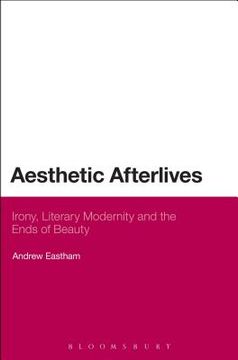Share
aesthetic afterlives: irony, literary modernity and the ends of beauty
Andrew Eastham
(Author)
·
Bloomsbury Academic
· Paperback
aesthetic afterlives: irony, literary modernity and the ends of beauty - Eastham, Andrew
Choose the list to add your product or create one New List
✓ Product added successfully to the Wishlist.
Go to My Wishlists
Origin: U.S.A.
(Import costs included in the price)
It will be shipped from our warehouse between
Monday, July 22 and
Monday, July 29.
You will receive it anywhere in United Kingdom between 1 and 3 business days after shipment.
Synopsis "aesthetic afterlives: irony, literary modernity and the ends of beauty"
Since the development of British Aestheticism in the 1870s, the concept of irony has focused a series of anxieties which are integral to modern literary practice. Examining some of the most important debates in post-Romantic aesthetics through highly focused textual readings of authors from Walter Pater and Henry James to Samuel Beckett and Alan Hollinghurst, this study investigates the dialectical position of irony in Aestheticism and its twentieth-century afterlives. Aesthetic Afterlives constructs a far-reaching theoretical narrative by positioning Victorian Aestheticism as the basis of Literary Modernity. Aestheticism's cultivation of irony and reflexive detachment was central to this legacy, but it was also the focus of its own self-critique. Anxieties about the concept and practice of irony persisted through Modernism, and have recently been positioned in Hollinghurst's work as a symptom of the political stasis within post-modern culture. Referring to the recent debates about the 'new aestheticism' and the politics of aesthetics, Eastham asks how a utopian Aestheticism can be reconstructed from the problematics of irony and aesthetic autonomy that haunted writers from Pater to Adorno.
- 0% (0)
- 0% (0)
- 0% (0)
- 0% (0)
- 0% (0)
All books in our catalog are Original.
The book is written in English.
The binding of this edition is Paperback.
✓ Producto agregado correctamente al carro, Ir a Pagar.

